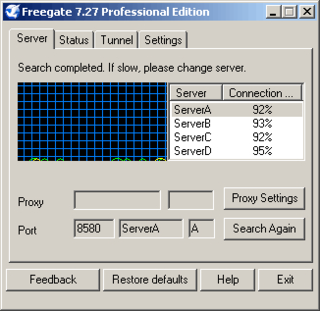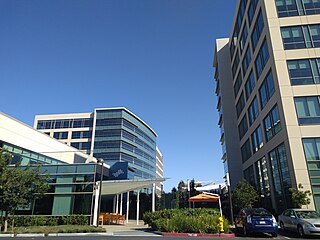Related Research Articles

Instant messaging (IM) technology is a type of synchronous computer-mediated communication involving the immediate (real-time) transmission of messages between two or more parties over the Internet or another computer network. Originally involving simple text message exchanges, modern IM applications and services tend to also feature the exchange of multimedia, emojis, file transfer, VoIP, and video chat capabilities.

A personal firewall is an application which controls network traffic to and from a computer, permitting or denying communications based on a security policy. Typically it works as an application layer firewall.
Deep packet inspection (DPI) is a type of data processing that inspects in detail the data being sent over a computer network, and may take actions such as alerting, blocking, re-routing, or logging it accordingly. Deep packet inspection is often used for baselining application behavior, analyzing network usage, troubleshooting network performance, ensuring that data is in the correct format, checking for malicious code, eavesdropping, and internet censorship, among other purposes. There are multiple headers for IP packets; network equipment only needs to use the first of these for normal operation, but use of the second header is normally considered to be shallow packet inspection despite this definition.

Trend Micro Inc. is an American-Japanese cyber security software company. The company has globally dispersed R&D in 16 locations across every continent excluding Antarctica. The company develops enterprise security software for servers, containers, and cloud computing environments, networks, and end points. Its cloud and virtualization security products provide automated security for customers of VMware, Amazon AWS, Microsoft Azure, and Google Cloud Platform.
Internet security is a branch of computer security. It encompasses the Internet, browser security, web site security, and network security as it applies to other applications or operating systems as a whole. Its objective is to establish rules and measures to use against attacks over the Internet. The Internet is an inherently insecure channel for information exchange, with high risk of intrusion or fraud, such as phishing, online viruses, trojans, ransomware and worms.
An application firewall is a form of firewall that controls input/output or system calls of an application or service. It operates by monitoring and blocking communications based on a configured policy, generally with predefined rule sets to choose from. The two primary categories of application firewalls are network-based and host-based.
Norton Internet Security, developed by Symantec Corporation, is a discontinued computer program that provides malware protection and removal during a subscription period. It uses signatures and heuristics to identify viruses. Other features include a personal firewall, email spam filtering, and phishing protection. With the release of the 2015 line in summer 2014, Symantec officially retired Norton Internet Security after 14 years as the chief Norton product. It was superseded by Norton Security, a rechristened adaptation of the original Norton 360 security suite. The suite was once again rebranded to Norton 360 in 2019.
Fortinet, Inc. is a cybersecurity company with headquarters in Sunnyvale, California. The company develops and sells security solutions like firewalls, endpoint security and intrusion detection systems. Fortinet has offices located all over the world.

F5, Inc. is an American technology company specializing in application security, multi-cloud management, online fraud prevention, application delivery networking (ADN), application availability & performance, network security, and access & authorization.
Barracuda Networks, Inc. is a company providing security, networking and storage products based on network appliances and cloud services.

Freegate is a software application developed by Dynamic Internet Technology (DIT) that enables internet users to view websites blocked by their governments. The program takes advantage of a range of proxy servers called Dynaweb. This allows users to bypass Internet firewalls that block web sites by using DIT's Peer-to-peer (P2P)-like proxy network system. FreeGate's anti-censorship capability is further enhanced by a new, unique encryption and compression algorithm in the versions of 6.33 and above. Dynamic Internet Technology estimates Freegate had 200,000 users in 2004. The maintainer and CEO of DIT is Bill Xia.
Outpost Firewall Pro is a discontinued personal firewall developed by Agnitum.

Symantec Endpoint Protection, developed by Broadcom Inc., is a security software suite that consists of anti-malware, intrusion prevention and firewall features for server and desktop computers.
In computing, a firewall is a network security system that monitors and controls incoming and outgoing network traffic based on predetermined security rules. A firewall typically establishes a barrier between a trusted network and an untrusted network, such as the Internet.

Tufin is a security policy management company founded in 2005 that specializes in the automation of security policy changes across hybrid platforms and security and compliance. The Tufin Orchestration Suite supports next-generation firewalls, network layer firewalls, routers, network switches, load balancers, web proxies, private and public cloud platforms and micro-services.
HCL AppScan is a family of desktop and web security testing and monitoring tools, formerly a part of the Rational Software division of IBM. In July 2019, the product was acquired by HCLTech and is currently marketed under HCLSoftware, a product development division of HCLTech.

Palo Alto Networks, Inc. is an American multinational cybersecurity company with headquarters in Santa Clara, California. The core product is a platform that includes advanced firewalls and cloud-based offerings that extend those firewalls to cover other aspects of security. The company serves over 70,000 organizations in over 150 countries, including 85 of the Fortune 100. It is home to the Unit 42 threat research team and hosts the Ignite cybersecurity conference. It is a partner organization of the World Economic Forum.

Gili Raanan is an Israeli venture capitalist and former founder of multiple software companies. Raanan started Sanctum in 1997, the company that created the Web application firewall AppShield and the web application penetration testing software AppScan. He later started NLayers which was acquired by EMC Corporation. He was a general partner at Sequoia Capital, the founder of Cyberstarts, and board member at Wiz, Adallom, Onavo, and Moovit, Snaptu.
Sanctum was a Santa Clara, California-based information technology company focused on application security. Sanctum offered a firewall, AppShield, and scanner, AppScan, for application-layer security for Web environments.
KeepSolid VPN Unlimited is a personal virtual private network software product available for iOS, macOS, Android, Windows, and Linux.
References
- ↑ "Sanctum's AppShield". Network World. Retrieved 2024-10-05.
- ↑ "Perfecto Technologies Delivers AppShield for E-Business - InternetNews". www.internetnews.com. 27 August 1999. Archived from the original on 2016-04-21. Retrieved 2016-09-12.
- ↑ Messmer, Ellen. "CNN - New tool blocks wily e-comm hacker tricks - September 7, 1999". www.cnn.com. Archived from the original on April 11, 2000. Retrieved 2016-09-12.
- ↑ "Method and system for dynamic refinement of security policies". Google Patents . 2002-12-31.
- ↑ "Method and system for extracting application protocol characteristics". Google Patents . 1999-07-01.
- ↑ "You need more than a firewall to stop hackers". ZDNET. Retrieved 2024-10-05.
- ↑ "Game Over? - Information Security Magazine". Archived from the original on 2014-12-15. Retrieved 2016-09-12.